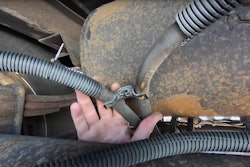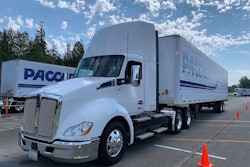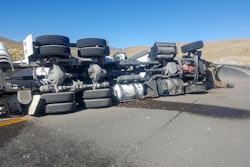Diesel truck emissions have been a hot-button issue for decades, but with three regulations floated in less than four months it's hit a white-hot nuclear-level of heat.
The U.S. Environmental Protection Agency (EPA) in December updated emission standards for heavy-duty commercial vehicles for the 2027 model year, tightening tailpipe NOx limits to a level 80%-plus below the current standard and reducing the particulate matter limit by 50%. The agency also will require that OEMs extend warranties to 450,000 miles from 100,000 and useful life limits to 650,000 miles from 435,000 miles.
The Biden administration last month cleared the way for California to require that half of all heavy trucks sold in the state be fully electric by 2035 – the first such mandate in the world.
The White House on Wednesday, as part of EPA's Greenhouse Gas (GHG) Phase 3 plan, directed the EPA to seek a technology-neutral approach that by 2032 could electrify 67% of new light-duty cars and trucks as well as electrifying 50% of vocational vehicles like buses and waste haulers; 35% of new short-haul regional tractors; and 25% of new long-haul trucks.
While these rules mostly impact manufactures of vehicles, they will affect trucking fleets by proxy since truck and engine manufactures will be required to hit minimum sales thresholds of zero emission equipment.
"The Phase 3 standards must take into account the complex challenges and operating conditions facing motor carriers as we manage the transition to a zero-emission future while simultaneously moving more than 72% of the economy’s freight," said American Trucking Associations President and CEO Chris Spear.
Owner-Operator Independent Drivers Association (OOIDA) President Todd Spencer called the measures a "Biden-Harris EPA [ongoing].... regulatory blitz on small-business truckers," noting Wednesday's proposal comes hot on the heels of NOx emissions rulemaking finalized in December and California's waiver mandating sales of electric trucks.
"(Wednesday's) announcement is a blatant attempt to force consumers into purchasing electric vehicles while a national charging infrastructure network remains absent for heavy-duty commercial trucks," Spencer said. "Professional drivers are skeptical of EV costs, mileage range, battery weight and safety, charging time and availability. It’s baffling that the EPA is pushing forward with more impractical emissions timelines without first addressing these overwhelming concerns with electric CMVs. The pursuit of this radical environmental agenda in conjunction with an anticipated speed limiter mandate will regulate the safest and most experienced truckers off the road."
Former Federal Motor Carrier Safety Administration Acting Director Jim Mullen, now executive director of the Clean Freight Coalition (CFC) – a group co-founded by ATA, Truckload Carriers Association, National Tank Truck Carriers, Truck & Engine Manufacturers Association and the American Truck Dealers group – said one of his organization's core tenets is the commitment of its members to the transition to zero-emission heavy trucks that will deliver reliable and affordable transportation of the nation’s freight, adding CFC members are investing billions of dollars into fulfilling that commitment "and have stood with EPA in support of stringent regulations that have delivered real-world emissions reductions in the heavy-duty truck industry. Ensuring a feasible transition to new technologies is our primary goal."
While his group's mission aligns with the overall goal of Biden's emissions plan, Mullen noted there's currently a lack of widespread infrastructure to support the speedy transition many of these mandates dictate.
"An adequate infrastructure, including the power grid and charging stations, and the sourcing of required minerals, are essential to the supply chain as part of the transition to a zero-emission future. Further, regulations must provide the lead time, stability, and certainty that allows for the industry to develop the technology, test in real-world conditions, and minimize downtime and operational disruption," he said.
“Companies represented by members of the CFC are currently producing zero-emission trucks that are being tested in fleets’ actual freight networks. The commitment to the transition to zero-emission heavy trucks is firm. The members of the CFC are uniquely situated to collaborate with the EPA by sharing industry data, case studies, and best practices to ensure that the transition to zero-emission vehicle technology does not have an adverse impact on the nation's supply chain. And candidly, the CFC members see this as their obligation."










